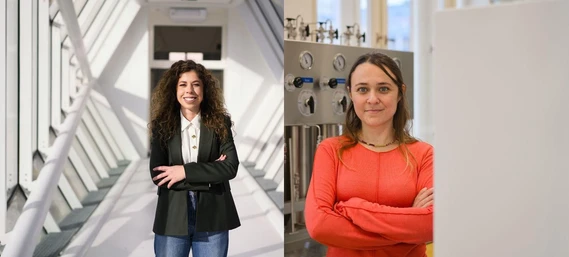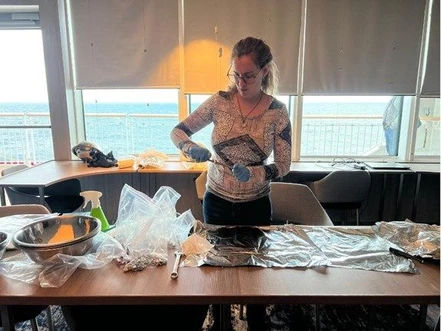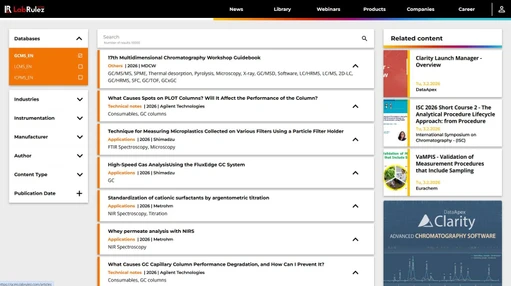11th Conference of the Czech Society for Mass Spectrometry (Day 2)
_l.webp)
CSMS: 11th Conference of the Czech Society for Mass Spectrometry (Day 2)
Programme of the 11th Czech Mass Spectrometry Conference 2023
👉 Complete programme including abstracts for download
-Odborny-program_l.webp) ČSHS: 11th Conference of the Czech Society for Mass Spectrometry (Day 2) - Scientific programme
ČSHS: 11th Conference of the Czech Society for Mass Spectrometry (Day 2) - Scientific programme
Programme CMSC 2023
Tuesday June 20, 2023
9:00 - 10:20 Section III
9:00 - 9:20 Unravelling Biological Sample Complexity With Advanced Mass Spectrometry
- Isabel Riba
Mass spectrometry has seen huge innovations over the last 30 years. Significant advancements in computing coupled with high-speed electronics has allowed huge strides in improvements in MS performance that have expanded the research capabilities of MS. Using hyphenated Mass Spectrometry techniques, we can determine what is in our samples and how much there is and even where analytes are.
Due to increasing sample complexity and the need for better quality data, high specificity and selectivity in the analysis method is required. Depending on the question being asked, different mass spectrometer platforms can be utilized to gain the required answer. In this presentation we will provide an overview of Waters Discovery Mass Spectrometry Platforms and explore how the latest innovations are being used to help scientist better characterize their samples.
_l.webp) ČSHS: Unravelling Biological Sample Complexity With Advanced Mass Spectrometry (Isabel Riba)
ČSHS: Unravelling Biological Sample Complexity With Advanced Mass Spectrometry (Isabel Riba)
9:20 - 9:40 Multiple linear regression of mobilograms of isomeric new synthetic drugs analyzed by cyclic ion mobility
- Marianna Nytka
Cyclic ion mobility uses traveling wave technology with a closed-loop separator, increasing the resolving power with a higher number of passes. The higher-resolution ion mobility can provide the separation of protomers or conformers. In this study, three isomeric pairs were analyzed by a SELECT SERIES Cyclic IMS (Waters Corporation, UK) in the form of (M⁺H)⁺ and (M⁺Cat)⁺ (Cat⁺ ~ Na⁺ or Li⁺). For protonated molecules, a higher number of passes provided a wider isomer’s peak due to the separation of protomers/conformers. Although the peaks overlapped, the individual isomer’s contribution was successfully determined by applying Composite Spectrum Regression (CSR) (OriginPro 2019b, OriginLab). The coefficient of determination (COD) for (M⁺H)⁺ was: 0.9718 and 0.9856 for 3-MMC/Buphedrone (7 passes) and 3-FMC/Flephedrone (10 passes), respectively. BDB and Methedrone significantly differed in their fragmentation which did not enable acquiring the appropriate ion signal intensity of (M⁺H)⁺ for both isomers. For comparison, the ion mobility separation of (M⁺Cat)⁺ was carried out too. Already in the 1 pass experiment, the pair BDB/Methedrone was baseline separated for both adducts (COD 0.9879 for ((M⁺Li)⁺). Such separation needed 10 and 25 passes for 3-MMC/Buphedrone (0.9930, (M⁺Na)⁺) and 3-FMC/4-FMC (0.9620, (M⁺Li)⁺), respectively. The multiple linear regression of mobilograms provided results comparable to adducts’ separation for 3-FMC/4-FMC and 3-MMC/Buphedrone. This approach can be useful if isomeric adducts are not separated or not generated with sufficient signal intensities. It is useful in distinguishing overlapped peaks.
_l.webp) ČSHS: Multiple linear regression of mobilograms of isomeric new synthetic drugs analyzed by cyclic ion mobility (Marianna Nytka)
ČSHS: Multiple linear regression of mobilograms of isomeric new synthetic drugs analyzed by cyclic ion mobility (Marianna Nytka)
9:40 - 10:00 RNA-modifications analysis by hydrophilic interaction liquid chromatography-mass spectrometry
- Anton Škríba
The post-transcriptional modification of RNA on nucleotides is a well-known phenomenon. Recent advancements in next-generation sequencing and mass-spectrometry based analysis have identified a new class of RNA modifications on 5’ end of RNA, termed RNA caps. These caps are typically derived from metabolites, cofactors, and dinucleotide polyphosphates. Although their presence is believed to influence RNA stability, cellular metabolism, and mRNA translation, their exact role remains poorly understood. Currently, these molecules are analyzed by reversed-phase chromatography with ionpairing agents, such as trialkylammonium salts. It is well established technique, however the presence of high salt concentration is suppressing the ionization and lowering the sensitivity of mass spectrometry detection. We have developed an alternative method, relying on HILIC (hydrophilic interaction chromatography), which does not need such strong ion-pairing agents and can be used even on longer oligonucleotides (3).
This work presents a qualitative and quantitative analysis of canonical and non-canonical 5'-RNA caps in bacteria and mammalian tissue cell cultures. The protocol was applied on investigation of NAD cap in RNA from HIV-infected MT4 cells, coenzyme A in bacteria, and hypermethylation of canonical cap in small nuclear RNA. The structural identification of these caps was validated based on retention time, m/z ratio and compared to commercial standards. In some cases, fragmentation spectra were acquired to confirm the identity of the caps. The results are currently used to elucidate the different biological roles of these caps.
_l.webp) ČSHS: RNA-modifications analysis by hydrophilic interaction liquid chromatography-mass spectrometry (Anton Škríba)
ČSHS: RNA-modifications analysis by hydrophilic interaction liquid chromatography-mass spectrometry (Anton Škríba)
10:00 - 10:20 Aspergillus fumigatus and Pseudomonas aeruginosa interplay at a host interface
- Rutuja Patil
Introduction: Invasive aspergillosis caused by the opportunistic pathogen Aspergillus fumigatus (Af) is responsible for 600,000 deaths in 2019. After entering the host, Af is confronted with stagespecific innate immune responses. Moreover, in immunocompromised individuals with respiratory disorders, Af co-exist with the bacterial pathogen Pseudomonas aeruginosa (Pa) leading to a worsened prognosis. Af secretes siderophores and mycotoxins to survive and defend inside host body. It is therefore, clinically significant to understand molecular interactions of activated secondary metabolism between pathogens and host cells to develop appropriate therapeutic strategies.
Methods: For dual culture, Af and Pa were grown in an iron-limited medium and interaction was visualized using scanning electron microscopy. For Af-immune cell interaction, neutrophils were incubated with Af mycelia in RPMI medium. Siderophores were extracted using liquid-liquid whereas mycotoxins and human neutrophil peptides were extracted by solid phase extraction. All analytes were quantified by liquid chromatography and mass spectrometry. CycloBranch and MassLynx 4.1
softwares (Waters) were used for data analysis.
Results: Co-existence of both microbes was observed in a co-culture. Af siderophore production suppressed from stationary phase of Pa growth. Conversely, Af siderophore secretion increased by 48h during interaction with neutrophils. Exposure of Af by neutrophils resulted in mycotoxins; gliotoxin and bis-methyl gliotoxin production. All three forms of human neutrophil peptide secretion increased in the presence of Af compared to control samples. Our results showed that Af siderophore and mycotoxin production is crucial during combat with Pa and neutrophils.
_l.webp) ČSHS: Aspergillus fumigatus and Pseudomonas aeruginosa interplay at a host interface (Rutuja Patil)
ČSHS: Aspergillus fumigatus and Pseudomonas aeruginosa interplay at a host interface (Rutuja Patil)
10:20 - 11:10 Zdeněk Herman Award presented by Resonance Foundation and presentation of the winning thesis
Article (CZ): Zdeněk Herman: The beginnings of mass spectrometry in our country and mass spectrometry at the Institute of Physical Chemistry of the Academy of Sciences
Zdeněk Herman was born on 24 March 1934 in Libušina near Kladno. Graduate of the Faculty of Mathematics and Physics at Charles University, majoring in physical chemistry and radiochemistry. He has been working at the Institute of Physical Chemistry of the Academy of Sciences since 1957. He is interested in mass spectrometry and kinetics and dynamics of ion collisions, and has published over 220 papers in these fields. He introduced to us the molecular beam method applied to this research, especially to the study of the dynamics of chemical reactions of ions by the method of scattering in crossed particle beams. He has also worked abroad, in the USA at Yale University (1964-65, Visiting Scholar 1966) and as Visiting Professor at the University of Colorado (1968-69) and JILA (Joint Institute for Laboratory Astrophysics, Boulder, 1980, 2001) and at the University of Chicago (1993-97) as well as at a number of institutions in Germany, Austria, France, Britain and Japan. His work has been recognized in Germany with the Alexander von Humboldt Prize (1992) and in the Czech Republic with the main Czech Head Award for Lifetime Achievement (2003). International scientific journals have dedicated special honorary issues to his sixtieth birthday (J. Phys. Chem. 99, No.42, 1995) and his 75th birthday (Int. J. Mass Spectrom., Vol. 280, 2009). After 1990 he became Professor of Physical Chemistry at the University of Technology in Prague (1996) and is Honorary Professor of Ion Physics at the University of Innsbruck (1993), where he was also awarded an honorary doctorate (2009).
Article (CZ): Connections (with) Matfyz: Zdeněk Herman
The current episode of the series introduces Prof. Zdeněk Herman, a renowned physical chemist.
 ČSHS: Předání ceny Zdeňka Hermana Nadačním fondem Resonance
ČSHS: Předání ceny Zdeňka Hermana Nadačním fondem Resonance
 ČSHS: Prezentace vítězné práce
ČSHS: Prezentace vítězné práce
11:10 - 11:30 Coffee break
Sponsors and partners
- Pragolab
- Město Brno
- Bruker Daltonics
- Merck
- Amedis
- Waters Corporation
11:30 - 12:30 Section IV
- Chairperson: Rutuja Patel
11:30 - 11:50 Drawing a better map: Optimizing LC-MS analysis of biologicals
- Stanislav Kukla
Newer, faster, and more efficacious strategies for peptide mapping and analysis of biologicals are needed to help bring vital and potentially life-saving therapeutics to market as quickly as possible. In this talk we will discuss new strategies for bottom-up analysis of therapeutic proteins using faster enzymes, new buffer systems, and optimal column chemistries that enable analysts to perform peptide mapping experiments faster, in as little as an afternoon, and with fewer artifacts.
_l.webp) ČSHS: Drawing a better map: Optimizing LC-MS analysis of biologicals (Stanislav Kukla)
ČSHS: Drawing a better map: Optimizing LC-MS analysis of biologicals (Stanislav Kukla)
11:50 - 12:10 Application of the mass spectrometry to identify protein markers of Alzheimer's disease
- Ondřej Bucek
Alzheimer's disease is the most common dementia, affecting approximately 55 million people worldwide. It is estimated that around 2050 this number will likely exceed 150 million. Today, mutations in genes are known that predispose to Alzheimer's disease in 5 % of cases (familial Alzheimer's disease), but other cases are idiopathic. The most important genetic risk factor is the isoform of the lipid carrier apolipoprotein E, APOE4. There are various hypotheses for the origin of this disease. We focused on hypotheses related to neuroinflammation and dysregulation of lipid metabolism. Today's diagnostic methods are not suitable for early diagnosis of Alzheimer's disease and population screening. Positron emission tomography and markers in the cerebrospinal fluid are mainly used for diagnosis, but these are invasive methods. Therefore, markers detectable in the blood serum are needed. Based on the literature, we selected a panel of protein markers playing a role mainly in lipid metabolism or immune reactions relevant to Alzheimer's disease. We used blood serum and cerebrospinal fluid from patients and healthy individuals. We used ultra-high-performance liquid chromatography with mass spectrometry to quantify the panel of selected proteins.
Additionally, we measured proteins in cerebral organoids, cellular 3D models derived from human induced pluripotent stem cells, to determine the effect of apolipoprotein E genotype on the abundance of proteins characteristic of individual cell types and proteins related to Alzheimer's disease. The results can contribute to the investigation of the molecular mechanisms of the disease and help gradually reveal its principles by focusing on proteins with altered expression in certain stages of the disease. New protein markers could be used for early diagnosis of Alzheimer's disease.
_l.webp) ČSHS: Application of the mass spectrometry to identify protein markers of Alzheimer's disease (Ondřej Bucek)
ČSHS: Application of the mass spectrometry to identify protein markers of Alzheimer's disease (Ondřej Bucek)
12:10 - 12:30 Photo-Methionine, Azidohomoalanine and Homopropargylglycine Have Distinct Effect on the Growth of Auxotrophic and Prototrophic E. coli in Minimal Medium, Alter Protein Expression Levels and Incorporate into Newly Synthesized Proteins at Different Rates
- Roman Tuzhilkin
Residue-specific incorporation of non-canonical amino acids (ncAAs) is a technique introducing bio-orthogonal functionalities into proteins that find applications in protein characterization and quantification. In this work, protein expression with three methionine analogues – photo-methionine (pMet), azidohomoalanine (Aha) and homopropargylglycine (Hpg) – in proto-trophic E. coli BL-21 and auxotrophic E. coli B834 was investigated, and the effect of the ncAAs on bacterial growth and expression of two recombinant proteins – cytochrome b5 (b5M46) and green fluorescence protein construct (MBP-GFP) – were assessed. ncAA incorporation achieved in the auxotrophic E. coli strain after 26-hour expression was 50-70% for pMet, and approximately 50% for Aha; with medium and low expression levels of MBP-GFP and b5M46, respectively. In contrast to the auxotrophic strain, higher protein expression was achieved in the prototrophic host but with a sharp drop in the ncAA content after the first hours of expression. Similar protein expression levels and incorporation rates of 70-80% were achieved for both bacterial strains with Hpg. Our findings can provide guidance for expressing proteins with high content of the ncAAs, highlight the pitfalls when determining levels of methionine replacement by ncAAs using MALDI-TOF mass spectrometry, and point to a possible systematic bias in metabolic labelling techniques using Aha or Hpg.
_l.webp) ČSHS: Photo-Methionine, Azidohomoalanine and Homopropargylglycine Have Distinct Effect on the Growth of Auxotrophic and Prototrophic E. coli in Minimal Medium, Alter Protein Expression Levels and Incorporate into Newly Synthesized Proteins at Different Rates (Roman Tuzhilkin).jpg
ČSHS: Photo-Methionine, Azidohomoalanine and Homopropargylglycine Have Distinct Effect on the Growth of Auxotrophic and Prototrophic E. coli in Minimal Medium, Alter Protein Expression Levels and Incorporate into Newly Synthesized Proteins at Different Rates (Roman Tuzhilkin).jpg
12:30 - 14:00 Lunch
14:00 - 15:00 Workshop (Bruker)
_l.webp) ČSHS: Workshop Bruker (Gary Kruppa)
ČSHS: Workshop Bruker (Gary Kruppa)
15:00 - 16:00 Plenary lecture II: Mass Spectrometry for Chemical Synthesis and Analysis: including an appreciation of the work of Zdenek Herman (on-line)
- Graham Cooks (Fakulta Chemie, Purdue University, West Lafayette, IN, USA)
Over the course of a long career, entirely spent doing mass spectrometry, a major privilege has been my interactions with outstanding scientists, especially those who were also distinguished in other spheres. The late Zdeněk Herman is a prime example and this talk includes coverage of topics where our science overlapped as well as recollections of Zdeněk himself.
One such shared topic concerns collisions of ions with surfaces and the associated kinematics. This topic includes inelastic and reactive ion scattering from surfaces, energy partitioning and ion thermochemistry. This presentation reviews fundamentals of energy partitioning, angular scattering and target and projectile effects. It also deals with applications, including those of surface induced dissociation (SID) and with ion soft landing on surfaces, both topics of considerable current interest.
I shared with Zdeněk Herman, and many others of an earlier era of mass spectrometry, a strong interest in the instrumentation. Novel work is greatly facilitated by newly designed and built instruments and the scattering instruments at Prague and Purdue share fascinating and noteworthy differences and similarities.
In some topics, my style was not embraced by Prof. Herman. His strength in mathematics and fundamental physical chemistry led to his polite disinterest in my kinetic method of making thermochemical determinations. Zdenek is well-known for his cartoon representations of scientists he knew, and I rather think that the red steed in his semi-satirical cartoon me driving an out-of-control team of horses represents the kinetic method.
Zdenek Herman’s city, Prague, is one of the epicenters of world science. I illustrate its effect during a recent visit. This concerns accelerated reactions in microdroplets, which I will briefly present, followed by a consideration of the Hofmeister series and the possible role of the water radical cation (H2O)⁺. in explaining this effect.
In closing I reflect briefly on the boundless nature of creative work and how Prof. Zdeněk Herman demonstrated this and so serves as a model to which we should aspire.
 Purdue University/John Underwood: dr. Graham Cooks ve své laboratoř
Purdue University/John Underwood: dr. Graham Cooks ve své laboratoř
16:00 - 16:20 Coffee break
16:20 - 17:30 General assembly of the Society




